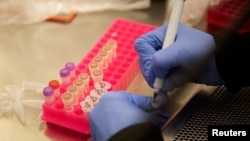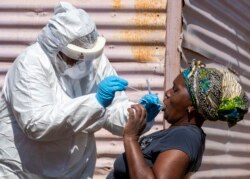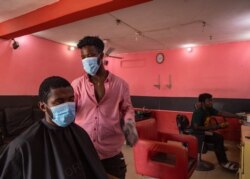The coronavirus pandemic is overshadowing this year’s World Malaria Day (April 25) in Africa, despite malaria’s much higher death toll across the continent. The World Health Organization says more than 380,000 Africans died from malaria in 2018, 94% of the world’s total. In contrast, Africa has so far confirmed about 1,200 deaths from the spreading coronavirus.
Health experts agree COVID-19 – the disease caused by the coronavirus - must be stopped from overwhelming already weak African health care systems; but, they worry the focus on the infection could roll back progress against malaria.
World Malaria Day comes at a time when Africa is struggling to make further progress against the mosquito-borne disease but also as the coronavirus pandemic threatens the continent’s weak health care system.
The World Health Organization says Africa accounts for 94% of global malaria deaths and between 2000 and 2014, malaria-related deaths fell by 40%.
But according to the WHO's World Malaria Report 2019, there have been few gains in reducing malaria infections and fatalities since.
Dr. Francis Kimani is with the Kenya Medical Research Institute. He says with the outbreak of COVID-19 in Africa, gains made against malaria could even be reversed.
“COVID will affect our flow, our resources, both human, financial and all that, and that may draw back some of the gains that have been brought in in malaria control, especially now that we are going into the malaria season with the long rains in and the peak season coming up," said Kimani. "If resources are diverted to COVID and other issues, if the population is not able to access health care promptly, if the supplies - drugs and malaria testing kits - don’t get to the facilities in good time, then obviously we expect that there might be some reversal in terms of the gains that have been gotten in terms of malaria control.”
Further complicating the fight against malaria - some symptoms, such as high fever, are similar to the coronavirus.
The London School of Hygiene and Tropical Medicine’s Professor Colin Sutherland says that could also undermine progress against malaria.
He spoke from London via a messaging application.
“Any person with respiratory symptoms and a fever will of course be suspected of having COVID anyway and will be treated as a potential COVID patient," said Sutherland. "So, there is a danger of course that malaria will be missed and not treated in that case.”
Despite the challenge to fighting malaria from the coronavirus, there is hope for making bigger gains against the parasitic disease.
Africa has been rolling out a promising malaria vaccine that the WHO says is effective in young children.
Ghana, Kenya, and Malawi in 2019 introduced the RTS,S vaccine, targeting around 360,000 children annually.
Dr. Kwaku Asante is the lead scientist for the Ghana Malaria vaccine pilot. He spoke from Accra via a messaging application.
“The latest on the RTS,S Malaria vaccine pilot is very exciting. We have realized that the uptake of the first dose of the malaria vaccine is about 70 percent in the areas where the vaccine is being conducted and the evaluation is going on very well," said Asante.
The program will run through 2022 as scientists study the effectiveness of the malaria vaccine for wider use in Africa.
Medical researchers are scrambling to develop a vaccine for the highly infectious coronavirus that they hope to have ready next year, at the earliest.
Meanwhile, some anti-malarial drugs have been touted as a possible treatment, or even cure, for coronavirus.
U.S. President Donald Trump has promoted the use of hydroxychloroquine as a possible “game changer” against COVID-19.
Medical experts like WHO Kenya Representative Rudolph Eggers have cautioned that the effectiveness of such drugs against the coronavirus is not clear.
"There have been some small studies done that show that chloroquine and hydroxychloroquine may be effective against this COVID disease but in fact it is not proven yet," said Eggers. "The evidence for this is quite unclear. So, as we are at the moment, we cannot actually make a definite statement against (anti-)malarials or (if they) are actually beneficial in the treatment of this disease.”
A U.S. government study released this week also suggested the use of hydroxychloroquine might be linked to higher death rates.







